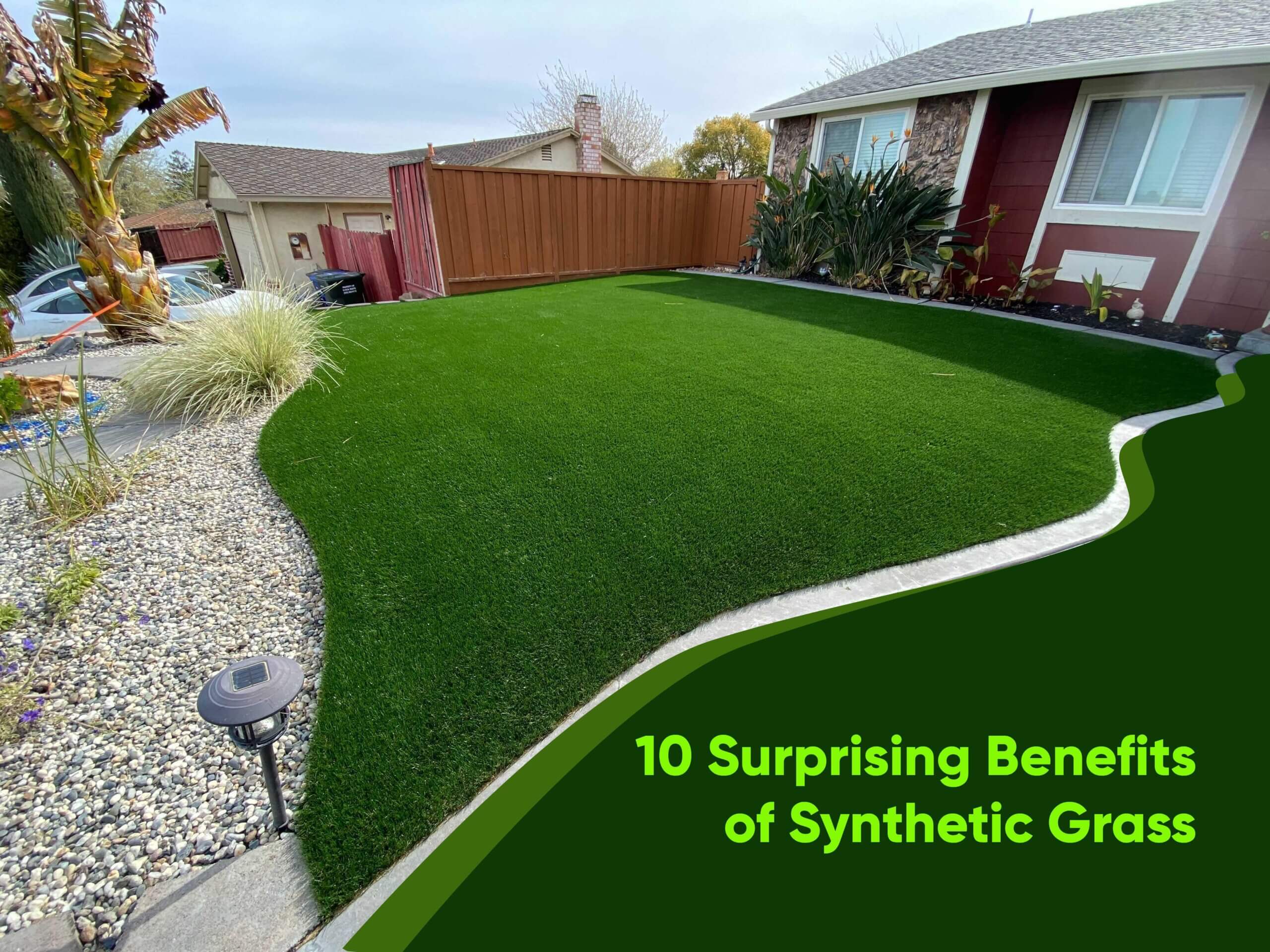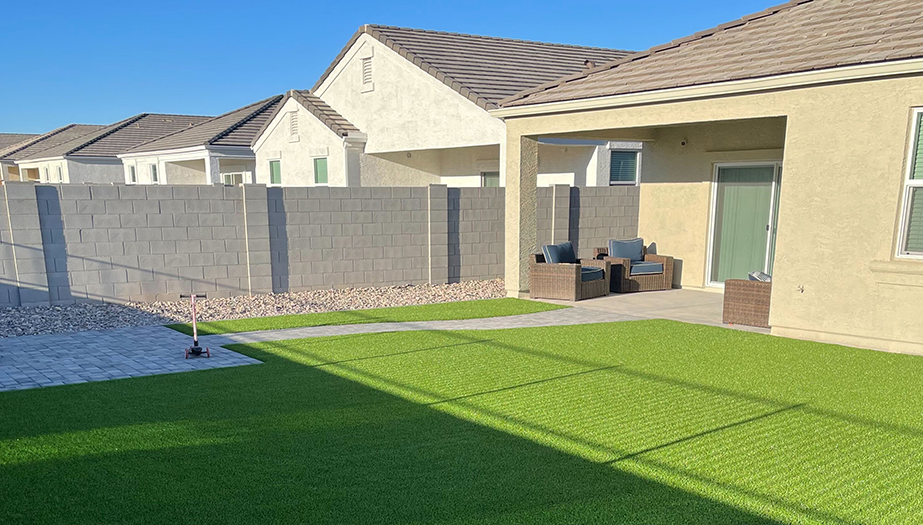Leading Reasons to Think About Artificial Lawn for a Low-Maintenance and rich Lawn
As property owners increasingly seek lasting options for outdoor spaces, fabricated grass offers an enticing choice to conventional lawns. Its ability to keep a lively appearance year-round without the concerns of watering, mowing, or chemical treatments makes it a sensible option for those aiming to decrease upkeep initiatives. Additionally, the ecological benefits, including significant water preservation and reduced dependence on pesticides, straighten with contemporary eco-friendly values. However, the advantages extend beyond mere looks and sustainability; checking out the multifaceted implications of fabricated yard reveals a comprehensive approach to backyard administration that benefits much deeper factor to consider.
Year-Round Greenery
Among one of the most considerable advantages of synthetic turf is its capability to offer year-round greenery, despite environment problems. House owners commonly encounter obstacles in maintaining a vivid grass as a result of seasonal adjustments, dry spells, or hefty rains. Man-made lawn gets rid of these issues, making certain a consistently lush look throughout the year.
This artificial option is crafted to hold up against different weather condition scenarios, from scorching summer season warmth to cold wintertime temperatures. Unlike all-natural lawn, which may brown or come to be uneven during severe conditions, man-made grass maintains its vivid shade and texture, boosting the visual charm of any kind of landscape.
Furthermore, synthetic lawn is resistant to pests and conditions that typically influence all-natural yards. This resilience adds to its enduring appeal, as there is no demand for chemical therapies or fertilizers that can be unsafe to the atmosphere. In addition, home owners can appreciate the aesthetic advantages of a well-maintained lawn without the intermittent obstacles postured by natural lawn care (turf installation).
Lowered Maintenance Efforts
Fabricated grass dramatically decreases upkeep initiatives, allowing property owners to appreciate a beautiful lawn without the lengthy jobs connected with natural yard treatment. One of the most notable advantages of synthetic grass is the removal of normal mowing. Without demand for a lawnmower, homeowners save both time and the expense of maintenance related to this equipment.

Cleansing artificial lawn is straightforward; a simple rinse with a hose pipe or the periodic cleaning to remove debris is typically enough - turf installation. This ease of treatment permits property owners to invest more time appreciating their outside spaces instead of laboring over them. In recap, the lowered maintenance initiatives associated with synthetic lawn make it an attractive option for those looking for a gorgeous, problem-free yard
Water Conservation Conveniences
The substantial decrease in maintenance efforts connected with synthetic lawn expands to water preservation, making it an eco-friendly choice for house owners. Standard grass require substantial amounts of water to remain dynamic and rich, usually bring about too much water use, specifically in dry regions. In contrast, synthetic lawn gets rid of the requirement for routine watering, significantly decreasing the overall water consumption in your backyard.
By going with synthetic grass, home owners can preserve thousands of gallons of water each year. This change not just benefits individual houses however also adds to broader environmental efforts targeted at decreasing water waste. In areas experiencing water deficiency, the adoption of artificial grass can play a significant duty in minimizing the impacts of drought and guaranteeing that important water resources are utilized more successfully.
Moreover, the setup of synthetic lawn can help lower municipal water need, benefiting the visit here community in its entirety. With expanding understanding of ecological issues, picking man-made grass offers as a proactive action towards lasting landscaping, assisting to preserve all-natural water sources while keeping see this here an aesthetically pleasing outside space (turf installation). In recap, artificial lawn offers a compelling option for water preservation, lining up ecological responsibility with contemporary landscape design demands

Bug and Allergic Reaction Reduction
A significant benefit of mounting artificial grass is its ability to decrease insects and allergens in outside areas. Standard yard lawns often work as reproducing premises for bugs such as mosquitoes, ticks, and ants, which can develop pain and wellness threats for pets and family members. In comparison, synthetic turf eliminates the natural material that brings in these bugs, thus substantially decreasing their populations in your yard.
In addition, natural grass can nurture mold and mildew, pollen, and various other allergens, which can cause allergies and respiratory issues for delicate individuals. Artificial turf supplies a cleaner setting, lowering the capacity for allergenic responses. Unlike natural yard, man-made turf does not produce plant pollen, making it an outstanding alternative for allergy victims seeking to enjoy their outside rooms without the danger of flare-ups.
Additionally, the absence of dirt in synthetic turf indicates there is much less dust and dust, more reducing air-borne allergens. This low-maintenance option not just enhances over at this website the aesthetic allure of your yard yet also promotes a much healthier outdoor atmosphere, permitting families to enjoy their grass without the constant concern of allergens and bugs. Hence, synthetic lawn is a strategic choice for those prioritizing convenience and health and wellness in their exterior space.
Long-Term Cost Cost Savings
Buying synthetic turf can cause significant lasting cost savings for home owners. While the first investment may seem considerable, the economic advantages over time can be considerable. Synthetic lawn gets rid of the demand for normal grass upkeep expenditures, such as mowing, feeding, and watering. Typical grass frequently need considerable resources to preserve a lush appearance, particularly in areas susceptible to drought or extreme weather problems.
In addition, the long life of artificial turf further enhances its cost-effectiveness. The majority of top quality artificial yard items can last 15 to 25 years with very little upkeep, reducing the requirement for replacement or comprehensive repair work. In contrast, all-natural lawn may require regular reseeding and regular treatment, which can swiftly accumulate in prices.
Energy cost savings are an additional crucial aspect. Property owners can anticipate to see lower water bills, as artificial grass does not require watering. Furthermore, the decrease in yard treatment services can maximize valuable time and sources, allowing home owners to designate their budgets somewhere else.
Verdict
In recap, synthetic yard provides numerous benefits for home owners looking for a vibrant and low-maintenance landscape. Its ability to supply year-round plant, paired with lowered upkeep efforts and considerable water conservation, makes it an attractive selection. Additionally, the reduction of parasites and allergens adds to a much healthier outdoor atmosphere. Inevitably, the long-term cost financial savings associated with man-made lawn strengthen its status as a sustainable and functional solution for enhancing outside areas.
Synthetic turf substantially decreases upkeep efforts, enabling property owners to take pleasure in an immaculate grass without the lengthy jobs connected with natural turf care.The significant reduction in maintenance initiatives linked with fabricated yard extends to water preservation, making it an ecologically pleasant choice for house owners. In contrast, man-made lawn eliminates the need for regular watering, considerably decreasing the overall water intake in your backyard.
In locations experiencing water scarcity, the fostering of man-made turf can play a significant role in reducing the results of dry spell and guaranteeing that valuable water sources are utilized more successfully.
With expanding awareness of ecological issues, picking man-made lawn serves as a proactive action towards lasting landscaping, helping to protect all-natural water sources while preserving an aesthetically pleasing exterior space.